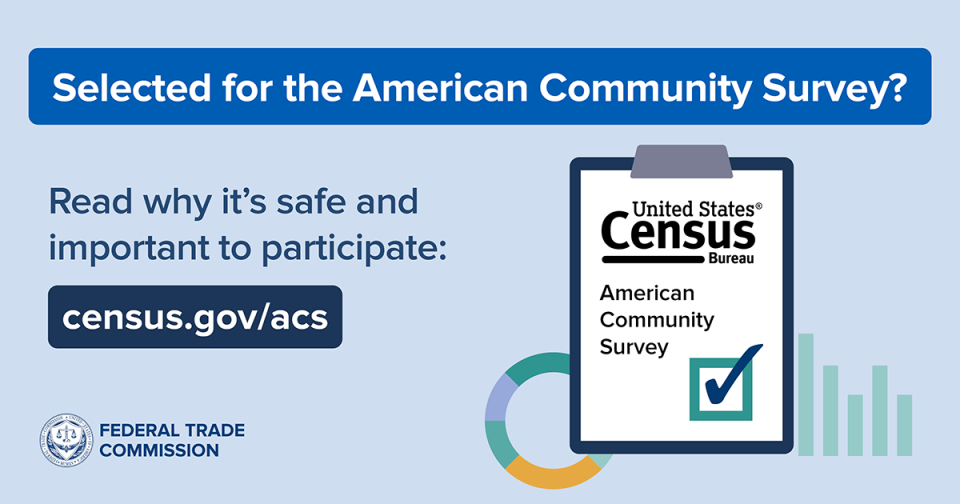 American Community Survey?" width="960" height="504" />
American Community Survey?" width="960" height="504" /> American Community Survey?" width="960" height="504" />
American Community Survey?" width="960" height="504" />
Getting a call, letter, or a visit about the American Community Survey (ACS) — when so many scammers are trying to trick you into sharing personal information — might make you think twice. And it’s good to think twice. But the ACS is a legitimate survey to collect information used to make decisions about how federal funding is spent in your community. Want to know more? Read on.
Annually, the U.S. Census Bureau — which is part of the Department of Commerce — randomly selects 3.5 million households around the country to participate in the ACS. Many federal, state, tribal, and local leaders use the answers to update their statistics.
If you got a survey and want to verify it’s legit, call your Census Bureau regional office . Here’s what else to expect:
To learn more, visit the U.S. Census Bureau’s ACS page and read more about Identity Theft and Online Security to help you protect your personal information.
Comments have been turned off for this consumer alert.It is your choice whether to submit a comment. If you do, you must create a user name, or we will not post your comment. The Federal Trade Commission Act authorizes this information collection for purposes of managing online comments. Comments and user names are part of the Federal Trade Commission’s (FTC) public records system, and user names also are part of the FTC’s computer user records system. We may routinely use these records as described in the FTC’s Privacy Act system notices. For more information on how the FTC handles information that we collect, please read our privacy policy.
The purpose of this blog and its comments section is to inform readers about Federal Trade Commission activity, and share information to help them avoid, report, and recover from fraud, scams, and bad business practices. Your thoughts, ideas, and concerns are welcome, and we encourage comments. But keep in mind, this is a moderated blog. We review all comments before they are posted, and we won’t post comments that don’t comply with our commenting policy. We expect commenters to treat each other and the blog writers with respect.
We don't edit comments to remove objectionable content, so please ensure that your comment contains none of the above. The comments posted on this blog become part of the public domain. To protect your privacy and the privacy of other people, please do not include personal information. Opinions in comments that appear in this blog belong to the individuals who expressed them. They do not belong to or represent views of the Federal Trade Commission.